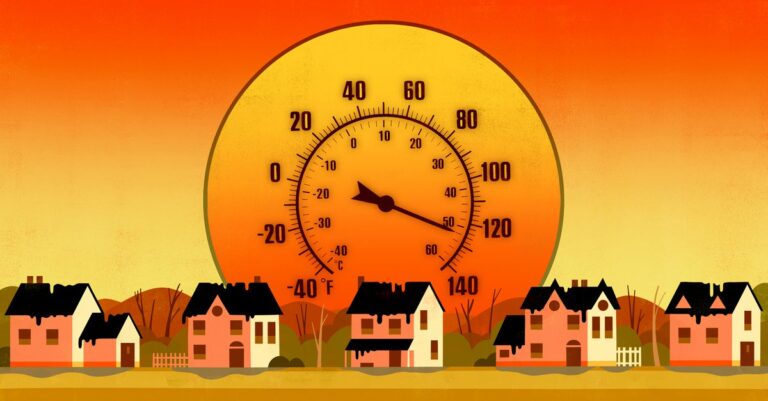A new report from the US Global Change Research Program shows that rising temperatures, extreme rainfall, drought and other climate-related challenges are intensifies in the Midwest. It provides an insight into significant changes in life and livelihoods, as well as the opportunity to mitigate the impact of global warming,
The fifth National Climate Assessment found that climate conditions are worsening, public and environmental health, and the region's economy are at risk.
“Warming temperatures, extreme precipitation, drought, and other climate-related events in the Midwest are affecting agriculture, ecosystems, cultural practices, health, infrastructure, and waterways,” the report states.
Hotter summers and weather that fluctuates between extreme drought and flood threaten crop and livestock production across the region. In addition, the report notes that milder winters allow pests that wreak havoc on crops to spread across the region.
The climate analysis warns that without intervention, Midwestern states that produce about a third of the world's corn and soybeans will struggle to do so. These states include Missouri, Iowa, Illinois, Wisconsin, Minnesota, Michigan, Indiana, and Ohio.
The Mississippi River Basin experiences more extreme flooding and low river conditions that lead to reduced river flow, greater stress on dams and other river-related infrastructure.
Since 1980, flooding alone has caused more than $49 billion in economic damage across the Midwest.
“This very abrupt and intermittent transition in a very short period of time, where you either feast or you go into famine, is a challenge for ecosystems,” said study co-author Jeff Wood, assistant professor of biometeorology at the University of Missouri School of Economics.
The climate assessment notes that the report's authors have low confidence in the district's current efforts to mitigate those changes, but Wood said he hopes that can change.
“There's been a lot of interest especially here in Missouri,” Wood said, pointing to solutions from the USDA, such as removing crops during the winter months to prevent soil erosion. “There is interest — it's growing — but more could be done.”
In the 2015 Paris Climate Agreement, nations agreed to keep global warming to 1.5 degrees Celsius (2.7 degrees Fahrenheit) or below.
In the COP28 Climate Action Conference underway in the United Arab Emirates, the US has pledged to phase out coal-fired power plants by 2035.
Coal makes up about 40% of fossil fuel emissions. As soon as 2022, the plants in Nebraska and Missouri announced delays in their closing plans.
Health and inequalities
The climate assessment also warns that a warming climate is worsening public health in the Midwest.
As temperatures rise, respiratory problems and air quality are expected to worsen, according to the report. Indeed, smoke pollution from wildfires, increased pollen production, and production of harmful ground-level ozone gases have recently plagued the Midwest.
Earlier this year, Midwest hospitals saw an increase in respiratory cases as wildfire smoke from Canada's wildfires blanketed the area.
Additionally, tick-borne diseases, including Lyme disease and other bug-borne diseases, are likely to increase as the weather continues to warm.
The Midwest section of the assessment points to green infrastructure, heat early warning systems and improved stormwater management systems as elements that could limit the health impacts of climate change.
The report found that the US is warming faster than the global average and that the effects of climate change are being felt in every part of the country, citing more extreme weather events, drought and wildfires becoming more frequent across the country.
In addition, the report found that minority communities are more likely to face challenges from climate change—particularly black, Hispanic, and indigenous communities—because these communities typically live in areas more susceptible to the effects of climate change.
“Climate change affects us all, but it does not affect us all equally,” said climatologist Katharine Hayhoe, one of the authors of the assessment. in an NPR article.
In the same article, Solomon Hsiang, a climate economist at the University of California, Berkeley and lead author of the assessment said:
“Research shows that people with lower incomes have more trouble adjusting [to climate change]because adaptation has a cost.”
“Climate adaptation actions taken in the United States to date have generally been small-scale and incremental in approach, involving small changes in business as usual.”
The Fifth National Climate Assessment
Adjustment action
Alice Hill, a climate expert at the Center on Foreign Relations, said there's a reason the US has been slow to implement climate mitigation policies. He said advocates in the US have been calling for a national climate change adaptation strategy since at least 2013.
“We still haven't, and that means we haven't defined the roles of the federal government, the roles of state and local governments, and the roles of the private sector,” Hill said as part of an interview about the impacts of climate change on housing.
“Climate change resilience requires all levels of government as well as the private sector to work together to understand the risk, understand what options are available and then talk about how we fund the investments to get to a place of greater security.” . Hill said.
The report outlines opportunities in the Midwest to fight back against climate challenges, including industry investments in “climate-smart” agriculture and federal infrastructure investments to prevent damage from extreme weather events.

